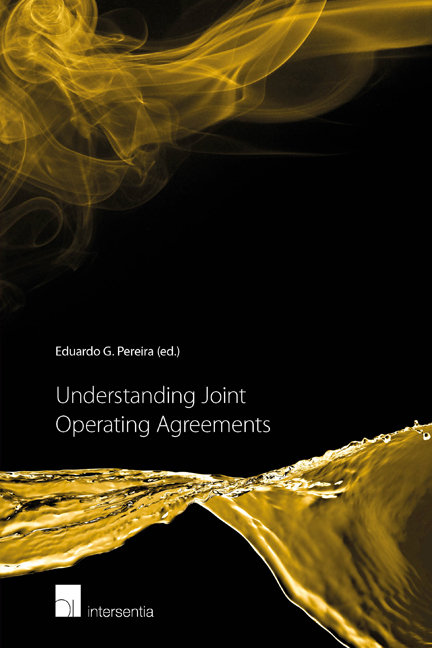Book contents
- Frontmatter
- Contents
- List of Abbreviations
- List of Authors
- Introduction
- PART I CONSIDERATIONS PRIOR TO ENTERING INTO A JOA
- 1 Bribery Laws and Compliance
- 2 The Relationship with Other Joint Venture Agreements
- 3 Unitisation and Unit Operating Agreements
- 4 Key Issues Relating to JOAs in Civil Law Countries
- 5 The Relationship between a JOA and a Host Government Instrument
- 6 Decommissioning Obligations, Practices and Procedures
- 7 Standards and Practices in JOAs across the Petroleum Industry
- 8 Modifying the Standard JOA to Accommodate Unconventional Petroleum Projects
- PART II SETTING UP A JOA
1 - Bribery Laws and Compliance
from PART I - CONSIDERATIONS PRIOR TO ENTERING INTO A JOA
Published online by Cambridge University Press: 15 December 2017
- Frontmatter
- Contents
- List of Abbreviations
- List of Authors
- Introduction
- PART I CONSIDERATIONS PRIOR TO ENTERING INTO A JOA
- 1 Bribery Laws and Compliance
- 2 The Relationship with Other Joint Venture Agreements
- 3 Unitisation and Unit Operating Agreements
- 4 Key Issues Relating to JOAs in Civil Law Countries
- 5 The Relationship between a JOA and a Host Government Instrument
- 6 Decommissioning Obligations, Practices and Procedures
- 7 Standards and Practices in JOAs across the Petroleum Industry
- 8 Modifying the Standard JOA to Accommodate Unconventional Petroleum Projects
- PART II SETTING UP A JOA
Summary
INTRODUCTION
The oil and gas sector is recognised as being at risk of corrupt practices. Some of the largest fines for bribery and corruption globally have related to the activities of oil and gas companies.
This chapter provides an overview of key anti-bribery and corruption (ABC) legislation and conventions that affect the oil and gas sector. It analyses the primary challenges and concerns affecting risk profiles of companies entering into JOAs, and provides guidance and practical advice on putting in place adequate ABC measures to deal with these risks.
KEY LEGISLATION AND INSTRUMENTS
UK: BRIBERY ACT 2010
The UK Bribery Act 2010 (Bribery Act) came into force on 1 July 2011. It criminalises the giving and receiving of bribes, bribery of foreign public officials and, significantly for companies, includes an offence of failing to prevent bribery by persons performing services for or on their behalf (associated persons) (Section 7 Offence). Such an association can arise from a company ‘ s relationship with contractors, suppliers, distributors or, as tends to be more common in the energy sector, joint venture partners. A company can be criminally liable for bribery committed by an associated person even if the company was unaware of the bribe. However, the company has a full defence if it can demonstrate that, despite a particular case of bribery, it nevertheless had ‘ adequate procedures ‘ in place to prevent persons associated with it from committing bribery.
The Bribery Act provides the most comprehensive anti-bribery legislation to date with a wide territorial reach. For an offence to come within the scope of the Bribery Act, it must have been committed in the UK or, if committed outside the UK, the off ender must have a close connection with the UK. Specifically, the Bribery Act applies if the offence was committed by a UK citizen, a person usually resident in the UK, or a company incorporated under the laws of the UK. Senior officers of a company that has engaged in bribery can also be prosecuted for the offence. International energy companies that carry on a business or part of a business in the UK, wherever in the world they may be incorporated or formed, will likely be caught by the Bribery Act.
- Type
- Chapter
- Information
- Understanding Joint Operating Agreements , pp. 5 - 26Publisher: IntersentiaPrint publication year: 2016



